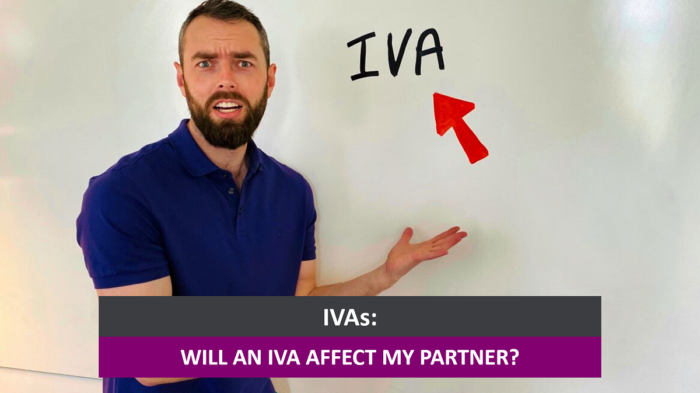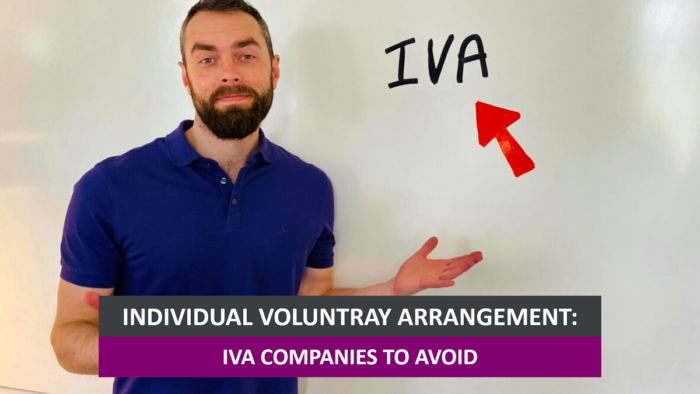Will an IVA Affect My Partner?
For free & impartial money advice you can visit MoneyHelper. We work with The Debt Advice Service who provide information about your options. This isn’t a full fact-find, some debt solutions may not be suitable in all circumstances, ongoing fees might apply & your credit rating may be affected.

For free & impartial money advice you can visit MoneyHelper. We work with The Debt Advice Service who provide information about your options. This isn’t a full fact-find, some debt solutions may not be suitable in all circumstances, ongoing fees might apply & your credit rating may be affected.
Are you thinking about getting an IVA? Are you worried that it may affect your partner? You’ve found the right place to get answers. We’re here to help you understand the process and how it may impact your loved one.
Each month, more than 170,000 people visit us for guidance on debt solutions. We know that the IVA process can seem confusing and that you may be worried about paying off your debt, but remember; you’re not alone.
In this guide, you’ll learn about:
- How an IVA works and how long it lasts.
- Whether an IVA could affect your partner.
- How your partner’s income might change your IVA payments.
- How an IVA could change your lifestyle.
- If it’s possible to get a joint IVA with your partner.
We’re a team of experts who have faced debt challenges ourselves and know how hard it can be. We’re here to help you navigate through this process. Let’s take a closer look at how an IVA could affect your partner and what to do next.
Don’t worry, here’s what to do!
There are several debt solutions in the UK, choosing the right one for you could write off some of your unaffordable debt, but the wrong one may be expensive and drawn out.
Fill out the 5 step form to find out more.
Will It have An Impact?
Possibly. There are definitely some ways through which an IVA could affect your partner but the ways in which it will affect them and the severity of these effects will depend entirely on your circumstances. So, let’s explore that:
Do Contributions Need to be Made?
No. An IVA stands for an Individual Voluntary Arrangement which means that it pertains to an individual person. Your partner or spouse is not expected to make contributions towards your IVA even if you’re married or are living together. You’re the one who will be solely responsible for making your IVA payments every month. That being said, there are some things to be aware of if your partner is living in the same house as you and are bringing income into the household.
Your creditors, as well as your IP, would expect your partner to make contributions towards your essential household expenses so that you have more money left over to contribute towards your IVA.

Does It Hurt Credit Rating and History?
IVAs definitely have a severely negative effect on the credit history of the person who has taken out the IVA. For you, the IVA will last on your credit report for six years. This is true even if your IVA ends in five years. So, for six years your ability to obtain credit will be severely impaired. Not only will the mention of an IVA in your credit report prevent you from obtaining any type of credit, but it will also have an effect on other aspects of your life.
For example, you may not be able to secure a job because you may not be able to secure a place to rent because of it.
When it comes to the effect it can have on your partner’s credit history, it depends.
If you and your partner have joint financial accounts, then your IVA would have an effect on their credit history as well.
In order to prevent this, your partner could apply for a Notice of Disassociation. This would break any financial link between you two and protect your partner from any negative effects that your IVA would normally have on them.
Please note that a Notice of Disassociation will only work if you don’t have any finances together that are active anymore.
For example, your partner can’t apply for a Notice of Disassociation if they have an active joint bank account with you, a joint loan with you that hasn’t yet been paid off or a joint mortgage with you (IVA with a mortgage is another aspect which you definitely need to think about if it applies to you).
Will I Still be Able to Contribute towards Household Expenses?
You can definitely still make contributions towards your household’s essential living expenses.
When you’re first considering an IVA, your IP will sit down with you and make a complete plan by asking you about your debts, your income, your partner’s income and your household’s monthly expenditure.
Your IP will take both you and your partner’s contributions towards essential living costs into account and make an IVA payment plan accordingly.
Your contributions towards the household are accounted for and you won’t have to worry about your partner having to take care of all the essential living costs of the household by themselves.
Is it Possible to get a Joint IVA?
Joint IVAs are a myth, so no. Only individuals can apply for IVAs, as the name suggests. That being said, if both you and your partner have joint debt, both of you can opt for IVAs individually and then get them interlinked. These types of IVAs are known as “interlocking” IVAs and they are often confused with joint IVAs. Interlocking IVAs would involve both you and your partner making one joint payment towards both of your IVAs.
Of course, both of you would have to apply individually but both of you would make a proposal that would suggest to the creditors that your IVAs are interlocked. For more information on the detailed process, both you and your partner can seek debt advice from your respective IPs. They will inform you on whether interlocking IVAs would be the best way to take care of your debts or not and if they are, how would you need to go about it.
Both you and your partner’s income would be taken into account as well as the monthly expenditure of your household. It’s also important to note that any conversation you have with your IP about your debt, your IVA, as well as other aspects, will be available to your partner and you would have access to their conversations as well.
It’s important that you think this decision through with your partner before you both opt for it. Remember that there are many other debt solutions available in the UK as well.
I’d highly advise that you seek advice from a debt professional first before you decide to opt for interlocking IVAs because while they’re definitely possible, they can sometimes be confusing and hard to pull off.
For debt advice, you can opt to contact an independent debt charity such as National Debtline or Stepchange.
They have professionals that will analyse your income, your expenditure and your debt in order to give you an accurate suggestion about which debt solution would be most suitable for you.
Not only that but they will also guide you on how to apply for the debt solution. When you’re seeking advice about debt from an agency, always ensure that they are authorised and regulated by the Financial Conduct Authority (FCA).
Does Income have an Effect on Payments?
For the most part, no. Your IP will only take your income into account when they are determining the payments you’ll be making towards your debts. However, if your partner has a drastically higher or lower income than you do, then this may have an effect on the amount you pay towards your IVA each month.
For example, if your partner has a high income, they may be expected by your IP as well as your creditors to make more contributions towards your home’s essential living costs. This would enable you to make more significant contributions towards your debts each month. On the other hand, if your S/O has a significantly lower income than you (or no income at all), then this will be taken into account as well.
It will be noted by your IP that you’re the sole person bringing money into the house and that you have to support both you as well as your S/O. As a result of this, they may set the bar lower for the payments you have to make towards your debts each month. Please note that in any case, you will never be obligated to pay more money towards your debts than what you can afford each month. Your IP will make sure of that.
